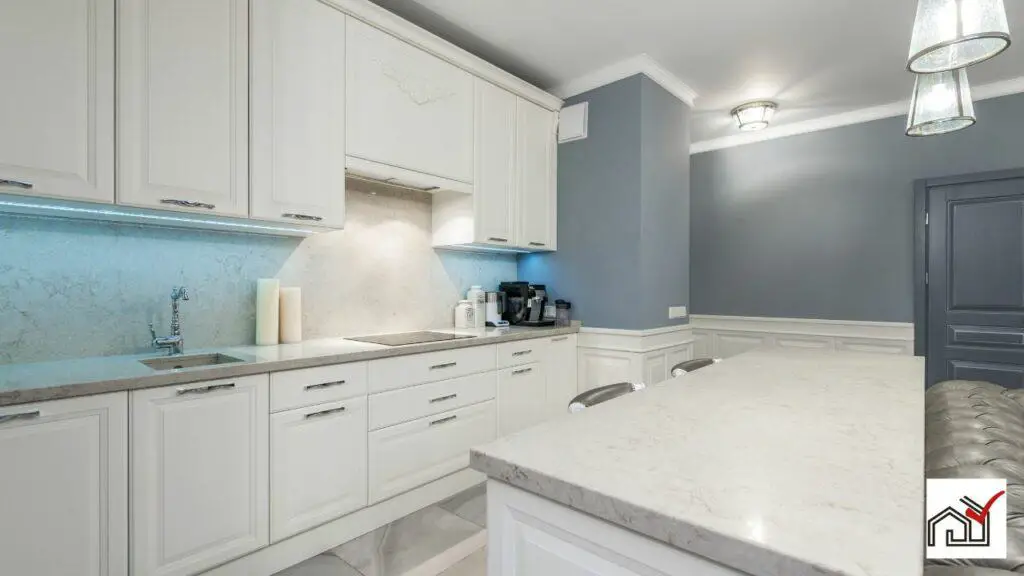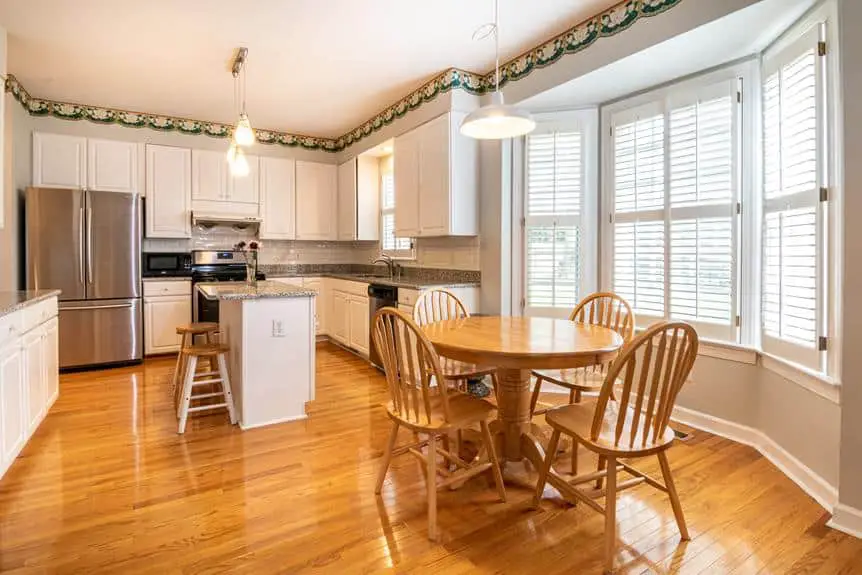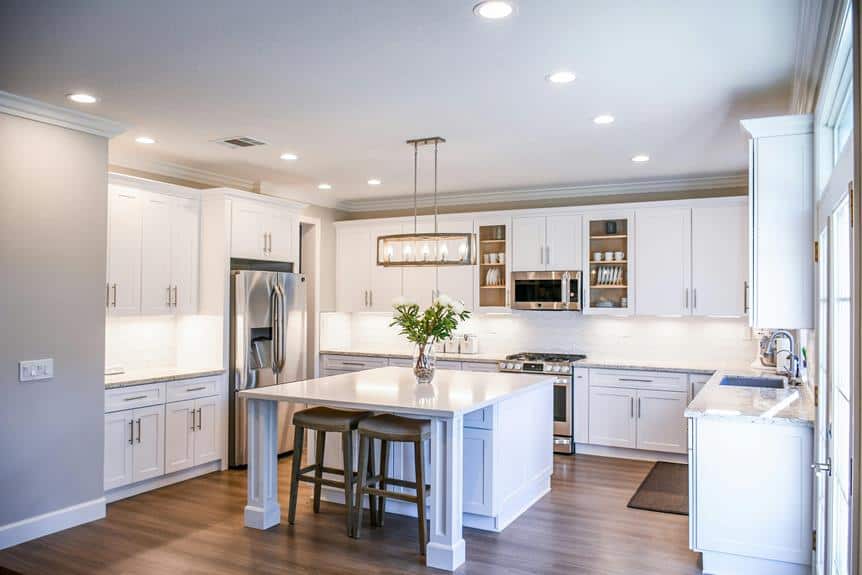For years, granite countertops have been the coveted top choice for kitchens.
But in the last few years, quartz kitchen countertops have become popular.
Both materials are beautiful and durable, but there are differences between them that can influence which one is best for you.
This guide will compare quartz and granite countertops side-by-side.
We’ll cover the advantages and disadvantages of each material, color versatility, maintenance requirements, cost, and more.
By the end of this guide, you’ll have all the facts to make an informed decision about which countertop is right for your home.
So let’s get started.
Here are the 7 main differences between granite and quartz countertops.
1. Material Composition
Granite countertops are entirely made of natural stone.
Granite blocks are quarried and cut into thin slabs.
They are then polished and fabricated into beautiful kitchen or bathroom countertops.
Quartz countertops come in various colors, making it possible to blend them perfectly with any home decor.
However, these countertop slabs don’t come straight from the quarry.
They are made by grounding pieces of stone byproducts that are then shaped into slabs for fabrication as countertops.
2. Appearance
Granite is a beautiful and popular countertop material because of its stunning variety of colors and patterns that can match any kitchen design.
It has unique mineral inclusions that give it a standout character, and so no two granite countertops ever look the same.
Although many homeowners love the look of granite, some prefer the convenience of quartz countertops.
This is because of their customizable design that gives you more options when choosing a color scheme.
With quartz, you know ahead of time which design or color will be perfect for your taste and needs.
However, with granite, you have to keep searching for a slab that can match your interiors.
3. Cost
Choosing the right countertop material for your home can be challenging, especially when it comes to premium materials like granite and quartz.
While both are high-end countertops, there’s no significant difference between their prices – each comes with a hefty price tag.
When it comes to granite countertops, you can expect to pay $80 to $175 per square foot, with installation fees included.
This will vary depending on the style and edging treatments that you request.
With quartz, costs typically range from $80 to $140 per square foot, which also includes installation fees.
While quartz used to be expensive, prices have come down in recent years due to its increase in popularity and availability.
However, both granite and quartz tend to be expensive because they both are shipped in containers across oceans.
This creates an element of unpredictability in their pricing since international petroleum prices can heavily influence the cost of transportation.
Moreover, tariffs and other factors can also play a role here.
No matter what kind of countertop material you choose, whether it’s quartz or granite, ensure that you set aside enough budget to cover the final cost of your project.
4. Durability
Granite is a strong material known for its resilience to heat and other environmental elements found in kitchens.
While it resists burns and marks well, its porous nature can make it vulnerable to staining if any spills are left sitting.
Moreover, as granite doesn’t have the same hardness as quartz, it’s prone to breakage under a high-impact blow.
Quartz, on the other hand, is much harder than granite and offers much more durability.
This makes these countertop almost indestructible over time.
Furthermore, due to its lack of porosity compared to granite, quartz countertops are easier to keep bacteria-free with regular cleaning and maintenance.
However, you should be cautious when using hot pans on quartz countertops as they can damage the countertop surface due to excessive heat.
So it’s recommended to use heating pads at all times on quartz countertops.
Further Reading: 5 Reasons Why Quartz Countertops Are Durable
5. Maintenance
Granite countertops need to be resealed annually.
This keeps them looking glossy and new while protecting them from acids, oils, and other liquids that can stain them over time.
Quartz countertops are naturally much more durable than granite, so aside from standard cleaning, there is no need for additional maintenance.
They look beautiful for a long time without having to be sealed or treated with anything else – except for maybe some kitchen love!
Whatever you choose for your countertop material – quartz or granite – make sure to maintain it properly with routine cleanings in order to keep them looking new.
6. Impact on the Environment

Granite and quartz countertops are both made of mostly natural materials.
However, the production process for each material is slightly different.
Granite countertops are made exclusively from stone, while quartz countertops are made by combining natural materials, color pigments, and polymer resins.
Furthermore, granite requires quarrying out of the earth, while quartz countertops are usually created using left-over stone byproducts.
So no quarrying is necessary for quartz counters.
In recent years, there have been some fears regarding radon emissions from granite countertops.
However, later studies from the EPA have proven that both granite and engineered stone countertops pose little or no risk in terms of radiation exposure.
In fact, the EPA has even stated that the radiation levels from these countertops are unlikely to increase the annual radiation doses above the normal, natural background levels.
7. Surface Area
Granite slabs tend to be narrower and shorter than quartz, with average measurements of 105 by 54 inches compared to standard-sized (120 by 55 inches) or jumbo-sized (129 by 65 inches) quartz slabs.
This makes granite countertops a bit easier for installers to handle.
However, this also means that more granite slabs are needed to cover a relatively large area.
On the other hand, quartz slabs allow you to cover small and large countertop areas with fewer pieces compared to granite.
This reduces both seam visibility and installation time.
Why Should You Choose Granite Countertops?
Are you undecided about whether to install a granite or quartz countertop in your home?
Here is the primary reason why many homeowners prefer the former.
For many homeowners, natural materials provide an authentic in-home experience.
Such people opt for solid wood flooring rather than laminate, wool area rugs over nylon, and wooden siding as opposed to vinyl.
Similarly, they seek out granite countertops with their unique striations and slight color changes rather than quartz’s factory-crafted designs and artificially colored elements.
However, you will have to reseal your granite countertop regularly to keep your home’s natural look without sacrificing performance.
You will also have to clean up liquid spills and food crumbles immediately.
Doing so will help your granite countertop stay true to the natural beauty that you desire for your home.
Why Should You Choose Quartz Countertops?
Quartz countertops have several benefits compared to their natural stone counterparts.
Firstly, quartz is non-porous and sometimes treated with a germ-fighting coating, meaning it’s more hygienic and easier to clean.
On the other hand, natural stone can absorb liquids which can lead to staining.
It may also harbor germs in its pores or capillaries.
Some granite is also dyed, and this dye can fade or become blotchy over time.
With engineered quartz countertops, you are getting a durable and stain-resistant material in an array of colors not available with natural stones.
Cleaning is easy to do with mild cleansers than what are needed for granite countertops.
So people with young children or elderly family members will appreciate the fuss-free maintenance of quartz countertops.
These countertops ensure fewer germs in the home without compromising on style.
Ultimately, engineered quartz countertops offer reliable performance with effortless upkeep.
This makes it an ideal choice for homeowners seeking low-maintenance and beautiful counters.
Further Reading: Granite vs. Porcelain Countertops | Quartz vs. Porcelain Countertops | Granite vs. Marble Countertops
Final Verdict
Granite and quartz countertops are two of the most sought-after kitchen materials today.
However, weighing the advantages and disadvantages of each is the key to making an informed decision.
Granite countertops possess superior heat resistance and contribute to a room’s character with their unique design characteristics.
However, they need a bit more maintenance than quartz countertops.
They also absorb liquids. So they need to be resealed periodically as well as cleaned frequently.
Nonetheless, granite offers an array of colors, veins, and textures for your aesthetic pleasure.
In comparison, quartz countertops provide superior durability compared to granite and offer easy maintenance with no need for sealing.
They also resist bacteria growth—a critical advantage for any household with small children or elderly residents.
However, on the downside, quartz doesn’t have the same level of heat resistance as granite.
Contact with hot pans can potentially damage quartz countertops over time.
Both granite and quartz have distinct advantages.
But ultimately, choosing between these two countertop materials depends on lifestyle preference.
Whichever one you pick, we wish you luck in making your dream kitchen come true.



